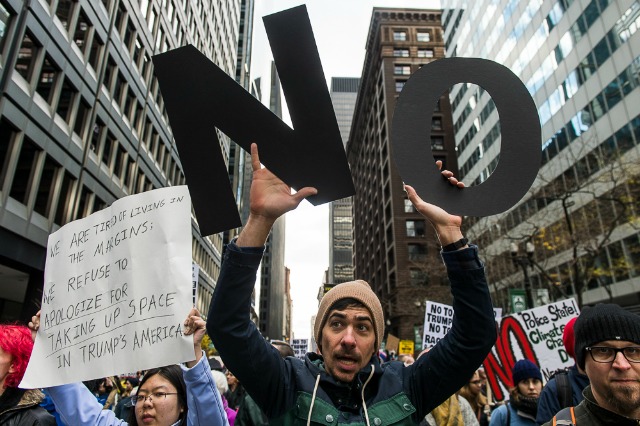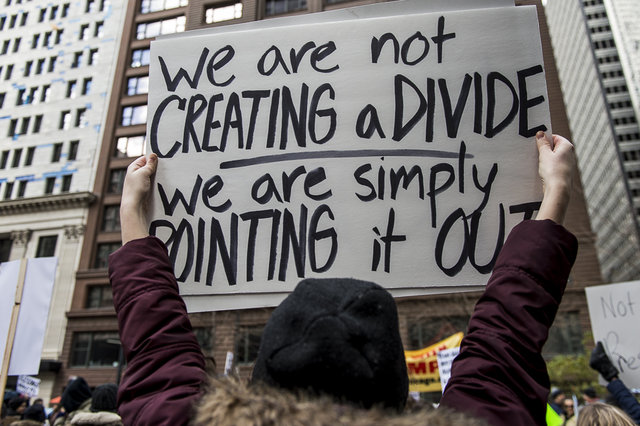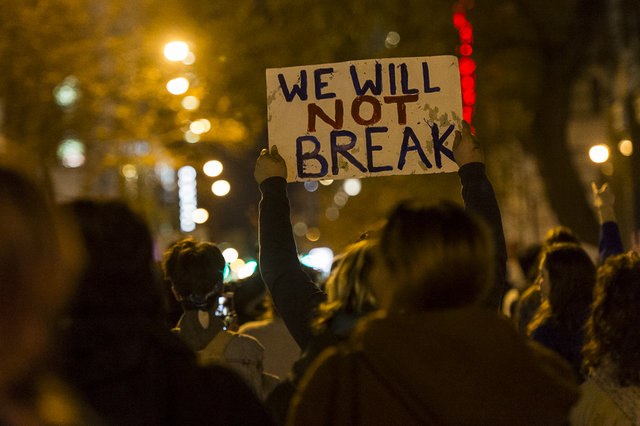4 Ways To Stop Complaining & Help Others In This Post-Trump Election World
By Chicagoist_Guest in News on Nov 21, 2016 6:40PM

By Courtney Jacobson
Not even two weeks have passed since the presidential election, and the time for grief and comfort has passed … now, evidently, is the time to attack our allies. News and social media are already filling up with debates over the “right” way to be an ally and activist, whether it’s the correct way to protest or the appropriate application of safety pins. This lack of cooperation for the same causes is maddening—and it’s a big part of how we got here in the first place. Instead of attacking one another, let’s do a few simple things to focus less on what people aren’t doing and more on what they can do to help:
1. Stop criticizing the ways people are taking action.
If you don’t want to wear safety pins on your clothing, that’s fine: don’t. If you don’t think protests will accomplish anything: don’t attend. But stop telling other people they’re doing something wrong by showing support or taking action. Undoubtedly, some people abuse symbols of solidarity or are superficial in their support. So it goes. But if the things that take minimal effort can do anything at all to help, they’re worth doing.
It’s especially important to remember, with increasing threats to an open democratic system, that our country has a long history of protests that helped successfully fight for liberties long denied. Protests garner media attention around issues, are a key tool of democracy, and are one of our most fundamental rights. And, yes, they’re noisy and disruptive, that’s why they’re called “protests” and not “tacit approvals.” These protests, signs, T-shirts, and pins are how we voice that bigotry is not acceptable. They’re how we stand up and say, “We will not be silenced. We will not accept this. This is not the new normal.”
The sad truth is that most people don’t even know where to start to support issues they care about. So, instead of criticizing people for taking that first step, talk to them about the next steps. And don’t just encourage them to “do something, do more.” Be ready with specific suggestions.

(Photos by Tyler LaRiviere/Chicagoist)
2. Stop dismissing people for not acting soon enough.
Not two weeks out and we’re already seeing the age-old post-election criticism—where were these people before the election? Well, quite likely, a lot of the people waving signs now were the same people phone banking before. These are the people taking action. But either way, people have now been motivated in a big way. A huge part of the population is under threat from a recent increase in hate crimes and, in a few months, a Republican dominated White House, Senate, House, and the potential for a Supreme Court ready to uphold some disastrous policy ideas. We need all the help we can get, so don’t squander that opportunity by telling people that if they showed up to the party late then they’re not invited at all.
There are still things you can do right now to help. Trump is selecting appointees to his administration-including Stephen Bannon, whose racist views have no place in the White House. Right now, you can call your elected officials and ask them to vocally oppose such appointments, which present a clear conflict of interest (or thank them for having done so!). Call the House Oversight Committee (202.225.5074) and lend your support to a bipartisan review of Trump's financials. The election’s over, but there’s still one more Senate seat up for grabs in a runoff election in Louisiana—donate or volunteer now to help balance the party divide in the Senate. There’s a short window in which to shore up support for a more fairly representative government, so if you haven’t taken action before, now is the time.
3. Be more welcoming to people of different backgrounds.
It can be difficult for people who don’t share common ground to stand up for one another. It can be hard to know how best to navigate supporting a culture you’re not familiar with. And it's hard for a lot of minority groups to trust people in positions of privilege because those people have all too often used that privilege to ignore, or even undermine their causes. But it’s the responsibility of those of us with privilege-white, male, straight, middle class, cisgender, educated, whatever-to stand alongside those without the same privilege.
As a white person, I need to do more to stand with People of Color. As a queer woman, I need my straight friends and male friends to stand with me. We all need to demonstrate loud and clear that our activism is real so that we can trust each other enough to work together. A show of solidarity is a great first step, but it’s only a first step. Be public in your show of support, because while Trump supporters and many media outlets normalize hate and bigotry, we need to normalize standing up for one another. That means promoting the Black Lives Matter message and Trans* Awareness—and not just on Transgender Day of Remembrance. We need to show that the people who care about these issues aren’t just the people most affected.
Be willing to talk to people you know about specific ways Trump administration policies would affect you. Call people out (politely) if they make offensive comments and explain why such statements are problematic, because silence normalizes hate. Be knowledgeable enough to discuss, for example, how increased police militarization disproportionately impacts people of color. And if you're helping organize the Chicago Women’s March in January, then make an extra effort to include women of color, the LGBTQAI community, and your males allies, as well!

Photo: Tyler LaRiviere
4. “Do … whatever you can’t not do.” - Luisa Rey, Cloud Atlas
There are a lot of things in life we simply can’t do. But we often fail to see the things we can do. When in doubt, find the thing you simply can’t stand to see happen and do whatever you can about it, however small.
Our society is not designed to make activism easy for the oppressed. So don’t blame people making minimum wage for not being able to take time off for a protest. Don’t blame people with three kids for not having time to volunteer. Don’t blame people with a mountain of student loan debt for not being able to donate money. There is no activism too small. There is no issue that doesn’t ultimately affect us all. And if we all take enough baby steps, we’re going to get pretty far.
Here in Chicago, we have a large, diverse population and excellent local organizations. Refugee One needs help later this year settling a family in Hyde Park that has been displaced by the civil war in Syria. The Illinois Coalition for Immigrant and Refugee Rights needs your support maintaining Illinois as a haven for immigrants and refugees (this is particularly important as anti-immigrant sentiment affects anyone perceived to be an immigrant). And if we want to revive checks and balances in two years, it will be time to start thinking about midterm elections soon: get ready to donate to or volunteer for campaigns of candidates you want to represent you, and send yourself a reminder to promote them and vote for them.